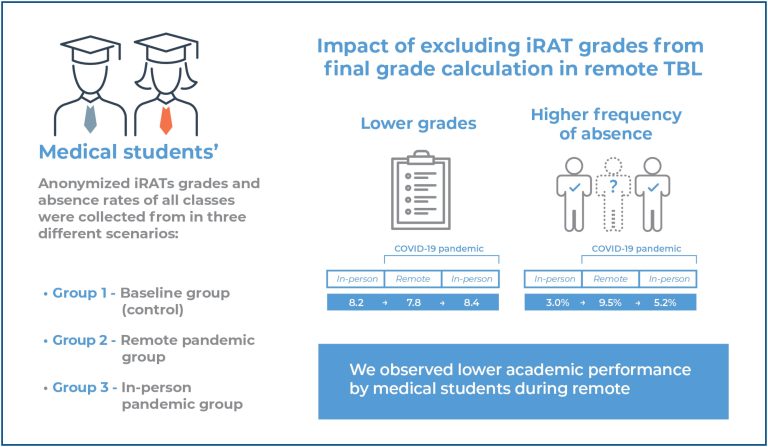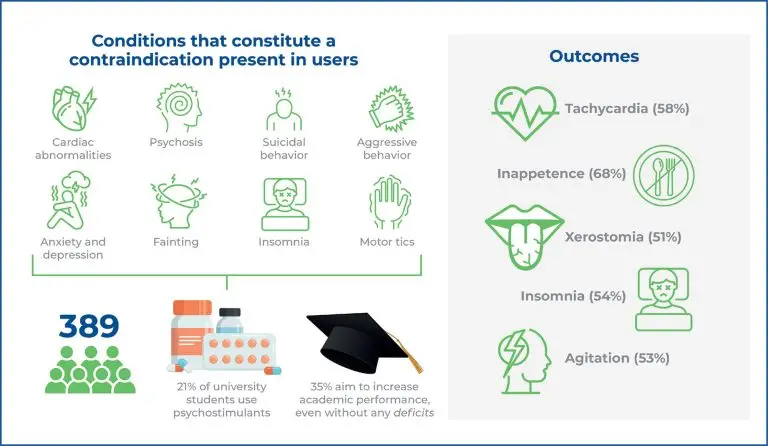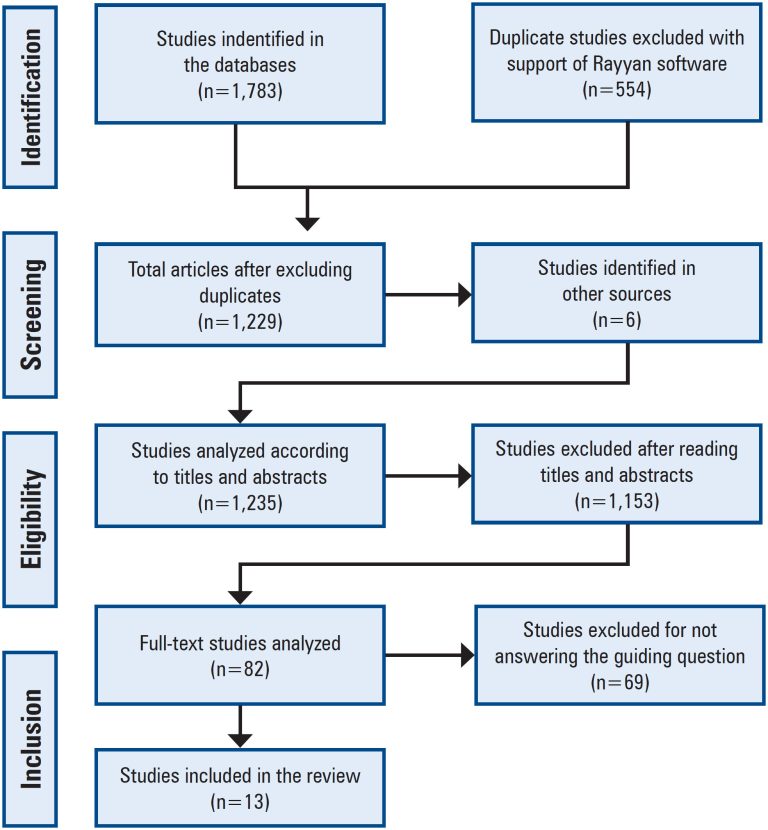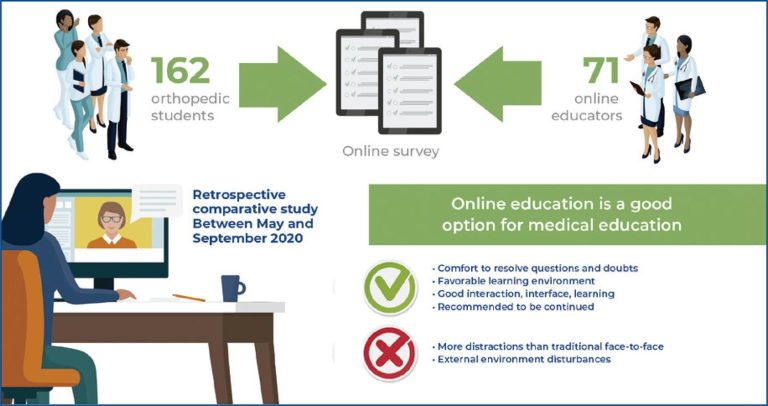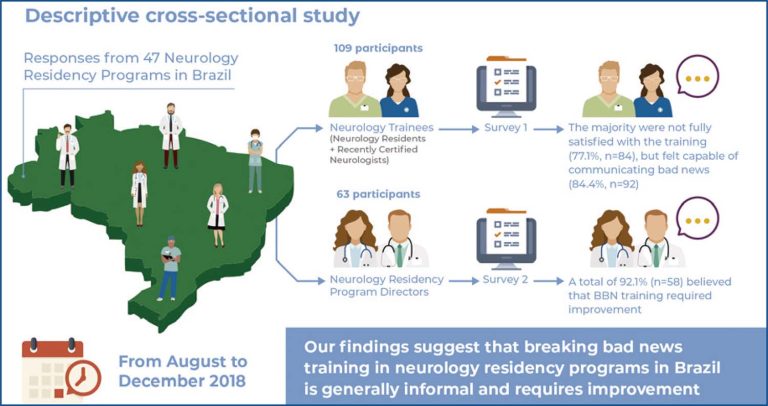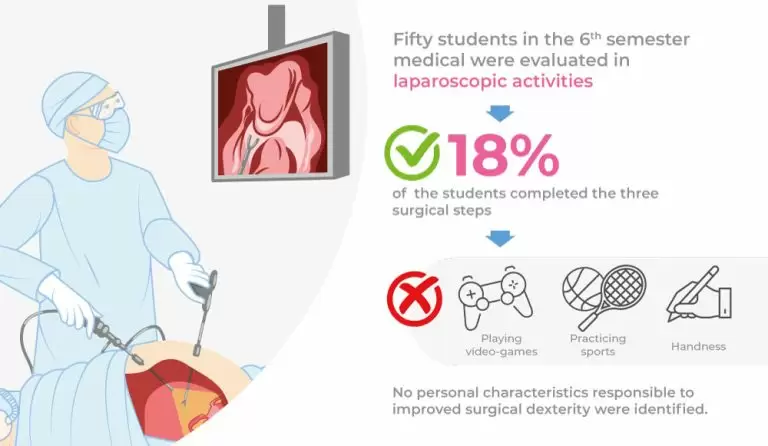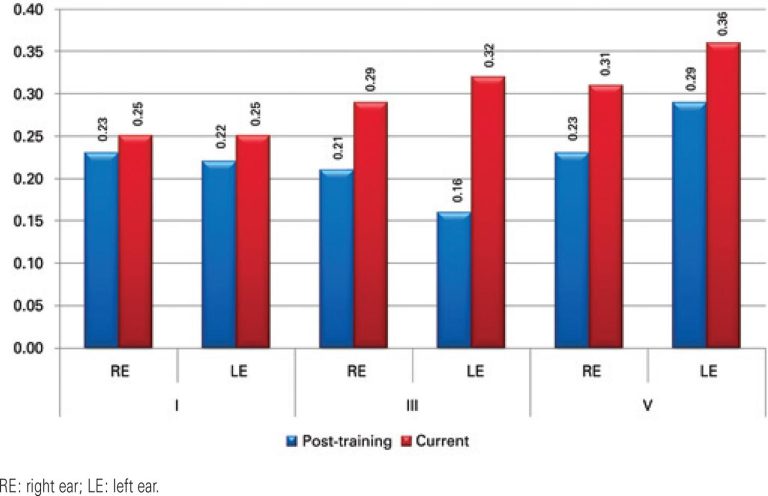24/Jan/2025
Remote team-based learning during COVID-19: lower academic performance is associated with the exclusion of test grades from final grades
einstein (São Paulo). 24/Jan/2025;23:eAO1007.
View Article24/Jan/2025
Remote team-based learning during COVID-19: lower academic performance is associated with the exclusion of test grades from final grades
DOI: 10.31744/einstein_journal/2025AO1007
Highlights ■ Remote team-based learning sessions were conducted during the COVID-19 pandemic, and their grades were not included in the final course grade calculation. ■ Remote team-based learning resulted in lower iRAT grades than in-person team-based learning, independent of the semester. ■ Remote team-based learning resulted in more students failing the test than in-person team-based learning. ■ Remote team-based learning resulted in lower student attendance than in-person team-based learning. ABSTRACT Introduction: The COVID-19 pandemic necessitated a shift from in-person to […]
Keywords: Academic performance; Educational measurement; Group process; Learning; Problem-based learning; School, medical; Students, medical; Team-based learning
18/Nov/2024
Adverse events and safety concerns among university students who misused stimulants to increase academic performance
einstein (São Paulo). 18/Nov/2024;22:eAO0895.
View Article18/Nov/2024
Adverse events and safety concerns among university students who misused stimulants to increase academic performance
DOI: 10.31744/einstein_journal/2024AO0895
Highlights Psychostimulant use in the studied population revealed the following: ■ Lack of a valid diagnosis, unsupervised use, drug interactions, and adverse effects. ■ Concomitant use of alcohol and drugs and contraindications such as depression/anxiety. ■ Acquisition without prescription and use to improve academic performance. ABSTRACT Objective: To evaluate psychostimulant drug use among academics in the health area of a higher education institution in Minas Gerais, Brazil. Methods: We conducted an online cross-sectional study of 389 university students from various […]
Keywords: Academic performance; Central nervous system stimulants; Drug interactions; Health sciences; Illicit drugs; Learning; Performance-enhancing substances; Prescription drugs; Students; Universities
11/Apr/2024
Implications of clinical simulation in motivation for learning: scoping review
DOI: 10.31744/einstein_journal/2024RW0792
ABSTRACT Objective: To identify, synthesize, and analyze the scientific knowledge produced regarding the implications of using clinical simulation for undergraduate nursing or medical students’ motivation for learning. Methods: The search for articles was conducted between July 28 and August 3, 2022, on the PubMed/MEDLINE, Scopus, Web of Science, and SciELO databases. The following was used for the search: P – undergraduate students attending Nursing or Medicine courses; C – motivation for learning, and C – skills and clinical simulation laboratory. […]
Keywords: Education, medical; Education, nursing; Learning; Learning health system; Motivation; Simulation training
25/Jul/2023
Changes in the methodology of medical teaching due to the COVID-19 pandemic
DOI: 10.31744/einstein_journal/2023AO0101
Highlights Teaching method preferences of medical students 162 and teachers 71 were evaluated. Both groups showed high satisfaction and a sense of learning in virtual classes. The virtual method resulted in worse retention of attention. The virtual method also showed higher interference from the external environment. ABSTRACT Objective To evaluate the perceptions of students and teachers regarding remote teaching modality in comparison with the traditional face-to-face method. Methods In this observational, retrospective, comparative, single-center study, questionnaires containing three major […]
Keywords: COVID-19; Education, distance; Education, medical; Learning; Motivation; Pandemics; School teachers; Students; Surveys and questionnaires; Teaching
30/Mar/2023
Breaking bad news in neurology: assessing training, perceptions, and preparedness among residency programs in Brazil
DOI: 10.31744/einstein_journal/2023AO0036
Highlights • Neurology trainees and program directors recognized a lack of structured breaking bad news training. • Program directors reported that many factors hinder the implementation of breaking bad news education. • Trainees felt capable of breaking bad news, but most did not have lectures, simulations, nor feedback. • Trainees acknowledged negative feelings when breaking bad news, including sadness and helplessness. ABSTRACT Objective We aimed to evaluate how breaking bad news training was implemented in neurology residency programs in Brazil […]
Keywords: Communication; Education; Internship and residency; Learning; Mentoring; Neurology; Surveys and questionnaires
09/Nov/2022
Evaluation of laparoscopic skills in medical students
DOI: 10.31744/einstein_journal/2022AO0091
ABSTRACT Objective To evaluate the laparoscopic skills of medical students and identify personal characteristics in terms of greater easiness in performing laparoscopic surgical procedures. Methods This study included medical students in the 6th semester of a Medical School in Brazil who answered 10 questions concerning their habits and characteristics. A laparoscopic platform and an abdominal synthetic model were used to assess surgical skills comprising the three following surgical steps: to pass the needle through the trocar and to place it […]
Keywords: General surgery; Laparoscopy; Learning; Motor skills; Teaching
08/Mar/2019
Training in recovery, perfusion and packaging of organs for transplants: profile of professionals and analysis of post-course learning
einstein (São Paulo). 08/Mar/2019;17(2):eAO4445.
View Article08/Mar/2019
Training in recovery, perfusion and packaging of organs for transplants: profile of professionals and analysis of post-course learning
DOI: 10.31744/einstein_journal/2019AO4445
ABSTRACT Objective To understand the profile of professionals working in organ harvesting, and analyze the learning results of those trained before and after the course on recovery, perfusion and packaging of organs for transplants. Methods A retroprospective, quantitative, analytical-descriptive study about the Course on Recovery, Perfusion and Packaging of Liver and Kidney, in the period from 2012 to 2014. Pre- and post-tests, with ten questions were used to assess knowledge about organ harvesting. The association of knowledge with applied content […]
Keywords: Learning; Patient care team; Tissue and organ harvesting/education
11/Dec/2015
Behavioral and electrophysiological auditory processing measures in traumatic brain injury after acoustically controlled auditory training: a long-term study
einstein (São Paulo). 11/Dec/2015;13(4):535-40.
View Article11/Dec/2015
Behavioral and electrophysiological auditory processing measures in traumatic brain injury after acoustically controlled auditory training: a long-term study
DOI: 10.1590/S1679-45082015AO3379
ABSTRACT Objective To investigate the long-term efficacy of acoustically controlled auditory training in adults after tarumatic brain injury. Methods A total of six audioogically normal individuals aged between 20 and 37 years were studied. They suffered severe traumatic brain injury with diffuse axional lesion and underwent an acoustically controlled auditory training program approximately one year before. The results obtained in the behavioral and electrophysiological evaluation of auditory processing immediately after acoustically controlled auditory training were compared to reassessment findings, one […]
Keywords: Acoustic stimulation; Auditory perceptual disorders; Brain injuries/complications; Learning; Neuronal plasticity
01/Apr/2014
Learning effect of computerized cognitive tests in older adults
DOI: 10.1590/S1679-45082014AO2954
Objective To evaluate the learning effect of computerized cognitive testing in the elderly. Methods Cross-sectional study with 20 elderly, 10 women and 10 men, with average age of 77.5 (±4.28) years. The volunteers performed two series of computerized cognitive tests in sequence and their results were compared. The applied tests were: Trail Making A and B, Spatial Recognition, Go/No Go, Memory Span, Pattern Recognition Memory and Reverse Span. Results Based on the comparison of the results, learning effects were observed […]
Keywords: computer assisted; Diagnosis; Elderly; Learning; Neuropsychological tests


